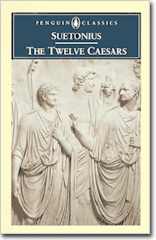
The Twelve Caesars
Suetonius
Translated by Robert Graves
315 pages
published around 100 AD?
One of the things I like best about England is the charity shops, as they provide you with a sheer inexhaustable supply of cheap reading matter. Granted, most of the books you find there are Mills & Boons, but over the years I've still discovered quite a lot of interesting, even rare books there. One of them was Suetonius' The Twelve Caesars, bought for 99p, along with several other Penguin Classic editions of Roman and Greek texts. (All translated in English; I'm not so pretentious as to read it in the original Latin or Greek even if I could...)
That was some years ago and I'd forgotten more or less about this, until Resolute Reader reviewed it, which inpsired me to read it as well. I was not disappointed. For something written almost 2,000 years ago this was surprisingly readable. A lot of the kudos for this must go to the translator, Robert Graves, who would later rework The Twelve Caesars into I, Claudius. He must have had good material to work with however, as even the best translation can only do so much to improve a weak original text.
Of course, the subject matter helps as well: none of the lives of the first twelve caesars of Rome was dull: war, court intrigue, insanity, plots and hefty doses of sex. The individual stories of the Caesars are about as much biography as history, with Suetonius not just providing details of their reigns, but also conscientiously writing down their family history and their private lifes and interests. All of this does not add up to a coherent history of the period; large chunks of context are missing and muc is glossed over. Then again, we can hardly fault Suetonius for not writing according to modern standards in history writing, if he even had the intention of writing a history that way.
The thing that struck me reading The Twelve Caesars is that the Roman Empire had a rotten core from the start. Few of the emperors here died of natural causes; there really wasn't any semblance of a mature succession system like the great European kingdoms would have. Even the good emperors, the ones which were deified after their deaths, were unscrupulous bastards. The politics of the Roman Empire were nasty, quite literally cutthroat.
Suetonius describes all this in a deliberately understated voice, letting the evidence speak for itself, without much need to editorialise. Several times in the book he does feel the need to go into the sources for a certain incident directly, where it conflicts with more common interpretations, much like a modern historian would. It is tempting to think of the ancients as primitives, but reading Suetonius makes it abundatly clear they weren't.
